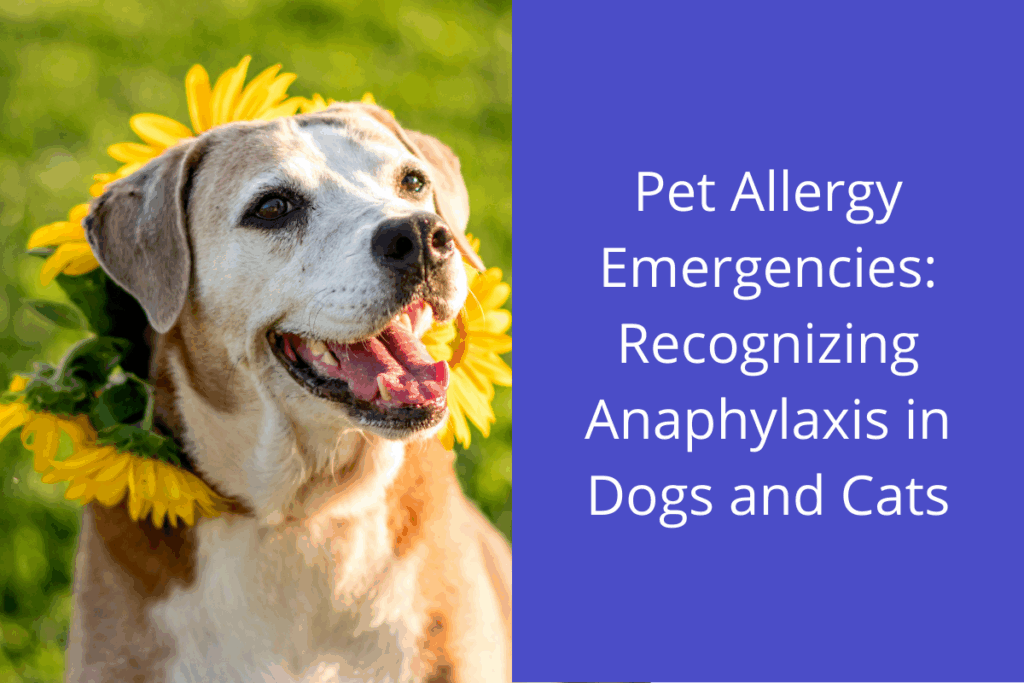Living in a vibrant community like Westfield, Carmel, Noblesville, or the surrounding areas often means sharing your life with a furry companion. But what happens when your beloved pet experiences a sudden and severe allergic reaction? Recognizing the signs of a life-threatening emergency like anaphylaxis is crucial for your pet’s well-being.
Understanding the Underlying Cause
Anaphylaxis, a severe and potentially life-threatening allergic reaction, can strike any pet, regardless of breed or age. While the thought of your beloved companion experiencing such a reaction can be frightening, understanding the underlying cause is the first step towards recognizing the signs and taking swift action.
Anaphylaxis occurs when the body’s immune system overreacts to a foreign substance, like an insect sting, certain medications, or food allergens. This triggers a cascade of events, leading to the release of powerful chemicals called histamines and other inflammatory mediators. These chemicals cause widespread inflammation throughout the body, affecting various organs and systems.
Here’s a closer look at the domino effect that unfolds during anaphylaxis:
- Exposure to an allergen: The immune system mistakenly identifies the allergen as a harmful invader.
- Mast cell activation: Specialized immune cells called mast cells become activated and release a flood of inflammatory chemicals, including histamines.
- Widespread inflammation: Histamines cause blood vessels to dilate and leak fluid, leading to swelling, hives, and difficulty breathing. Additionally, they trigger the contraction of muscles in the airways, further compromising breathing.
- Potential organ dysfunction: In severe cases, anaphylaxis can affect blood pressure, heart function, and even lead to shock.
Recognizing the signs of this life-threatening reaction is crucial for seeking immediate veterinary attention and ensuring your pet’s well-being.
Spotting the Warning Signs: Recognizing Anaphylaxis in Your Pet
Knowing the telltale signs of anaphylaxis in your pet is vital for acting quickly and saving their life. While symptoms can vary slightly between dogs and cats, some key indicators should raise a red flag and prompt immediate veterinary attention.
Here’s what to watch out for:
- Difficulty breathing: This is often the most noticeable sign, manifesting as rapid, shallow breaths, wheezing, or open-mouthed breathing. Your pet may struggle to catch their breath and appear extremely anxious.
- Facial swelling: Look for puffiness around the eyes, lips, and muzzle. In severe cases, swelling may extend to the entire face and neck.
- Skin changes: Hives, welts, and intense itching are common signs of an allergic reaction. The skin may appear red, inflamed, and uncomfortable for your pet.
- Vomiting and diarrhea: These digestive signs often accompany anaphylaxis, indicating widespread inflammation affecting the gastrointestinal system.
- Lethargy and weakness: Your pet may become unusually lethargic, weak, and disoriented. They may struggle to stand or walk and appear generally unwell.
- Sudden collapse: In the most critical cases, anaphylaxis can lead to sudden collapse and loss of consciousness.
Remember: Even if your pet only exhibits a few of these signs, it’s crucial to seek immediate veterinary care. Early intervention is essential for preventing life-threatening complications and ensuring your pet’s full recovery.
Taking Action During a Pet Allergy Emergency: What to Do and What Not To Do
Facing a pet allergy emergency can be overwhelming, but staying calm and taking the right steps is crucial for your pet’s well-being. Here’s what you should do and what to avoid during this critical moment:
Do:
- Act immediately: Don’t delay! Every minute counts in an allergic emergency. Call your emergency veterinarian or head straight to the nearest emergency animal hospital.
- Bring any relevant information: If possible, grab your pet’s medical records and any medications they are currently taking. This information can be invaluable for the veterinarian in assessing the situation and providing tailored treatment.
- Stay calm and reassuring: While the situation might be stressful, remain calm and reassuring for your pet. Speaking softly and petting them gently can help them feel safe and less anxious.
Don’t:
- Administer any medications or home remedies: Unless specifically instructed by a veterinarian, avoid giving your pet any medications or attempting home remedies. This could potentially worsen their condition.
- Panic: While the situation is serious, panicking can hinder your ability to act effectively. Stay calm, focused, and prioritize getting your pet the help they need.
Remember, immediate veterinary intervention is essential during a pet allergy emergency.
Keeping Your Pet Safe: Your Trusted Partner in Westfield, Carmel, and Noblesville
Recognizing the signs of anaphylaxis and taking swift action can make all the difference in your pet’s well-being during an allergic emergency. While this blog post equips you with valuable information, remember that prevention is always key. Scheduling regular wellness visits with your veterinarian allows for early detection of potential health concerns and proactive management of allergies.
At Small Animal Emergency Hospital of Westfield, we understand the unique bond you share with your furry companion. Our team of dedicated veterinarians and veterinary technicians is committed to providing exceptional emergency care, 24 hours a day, 7 days a week. Whether you live in Westfield, Carmel, Noblesville, or the surrounding communities, we’re here to ensure your pet receives the prompt and compassionate care they deserve during an emergency.
Don’t wait until an emergency arises. Equip yourself with the knowledge to recognize the signs of anaphylaxis and take action promptly. Schedule a wellness visit for your pet today and discuss any concerns you might have with our experienced veterinarians. Your pet’s health and happiness are our top priorities.








